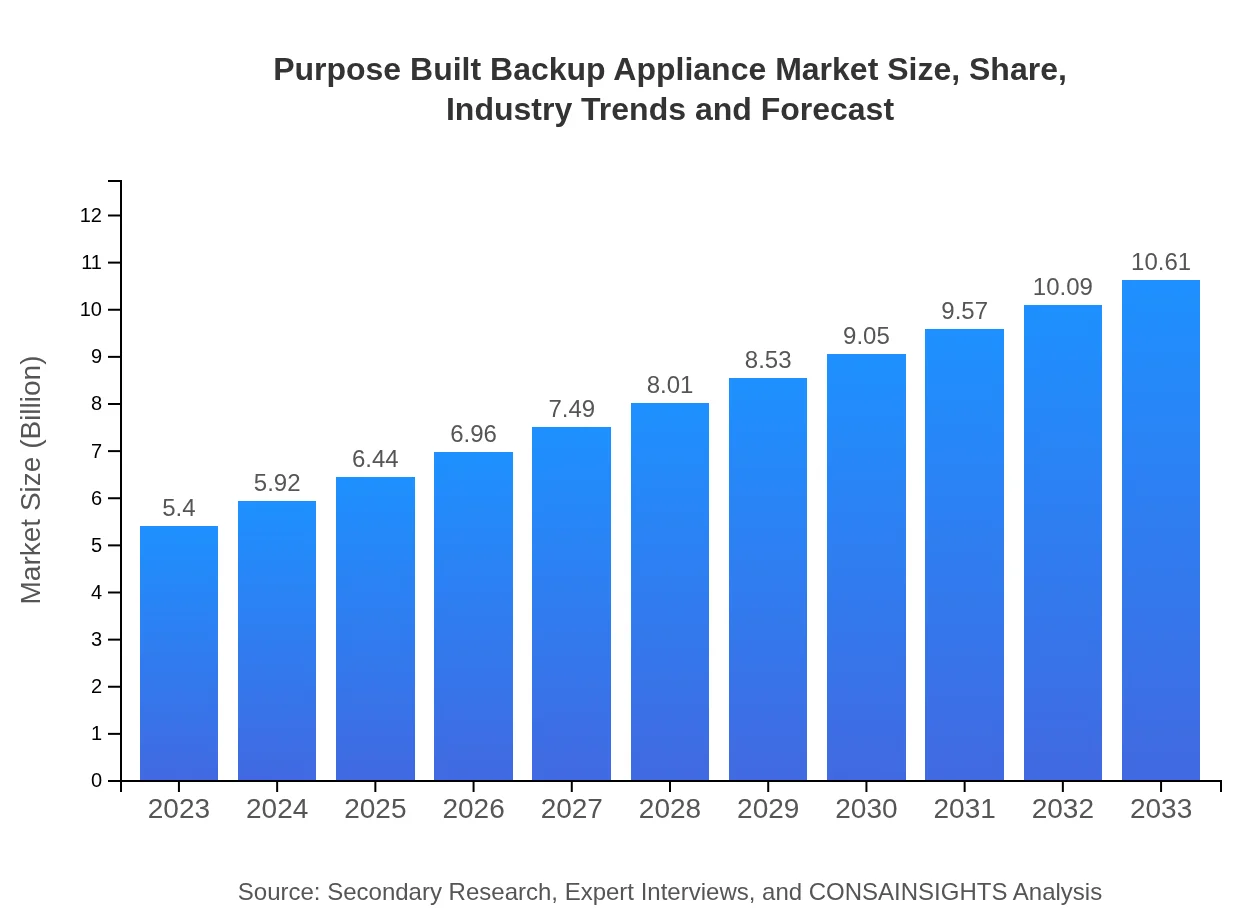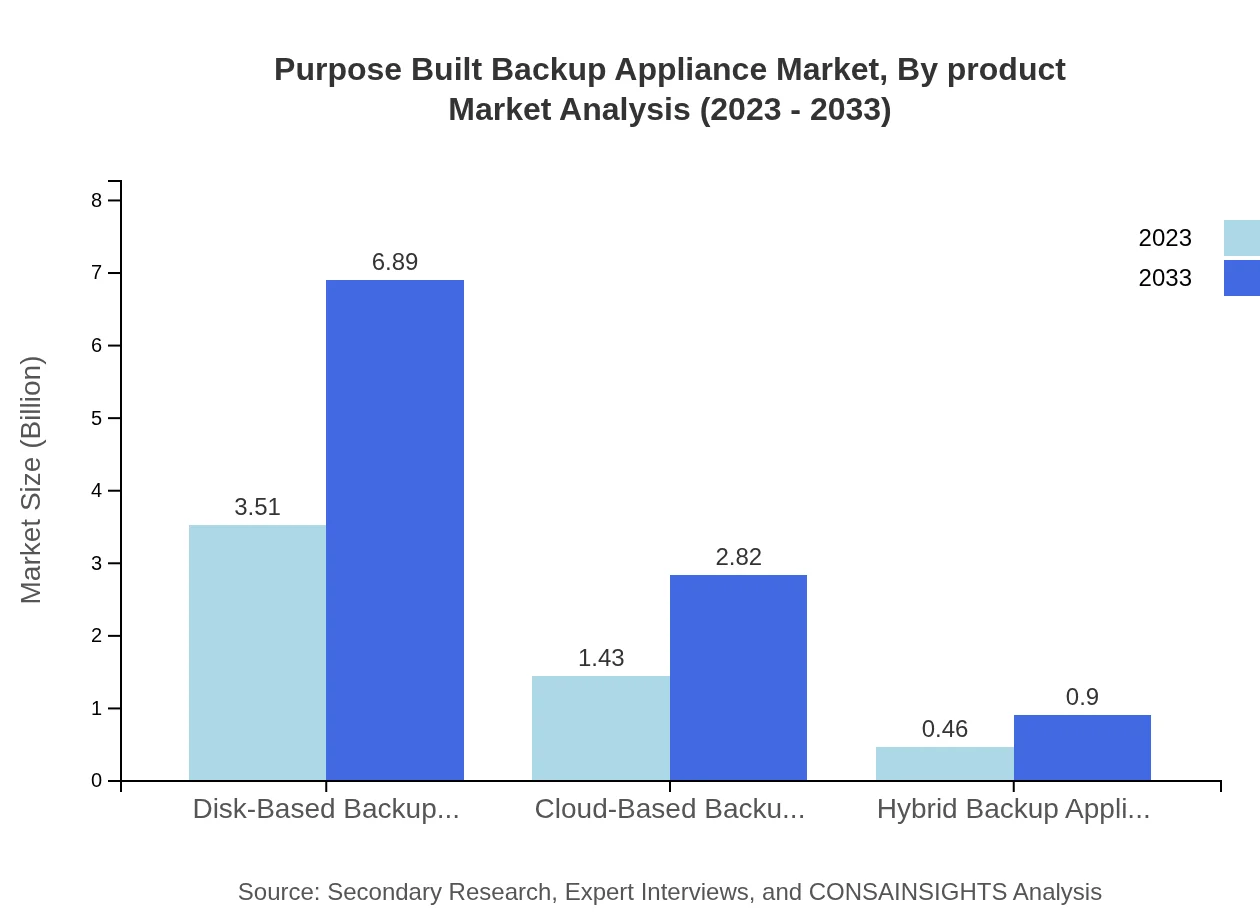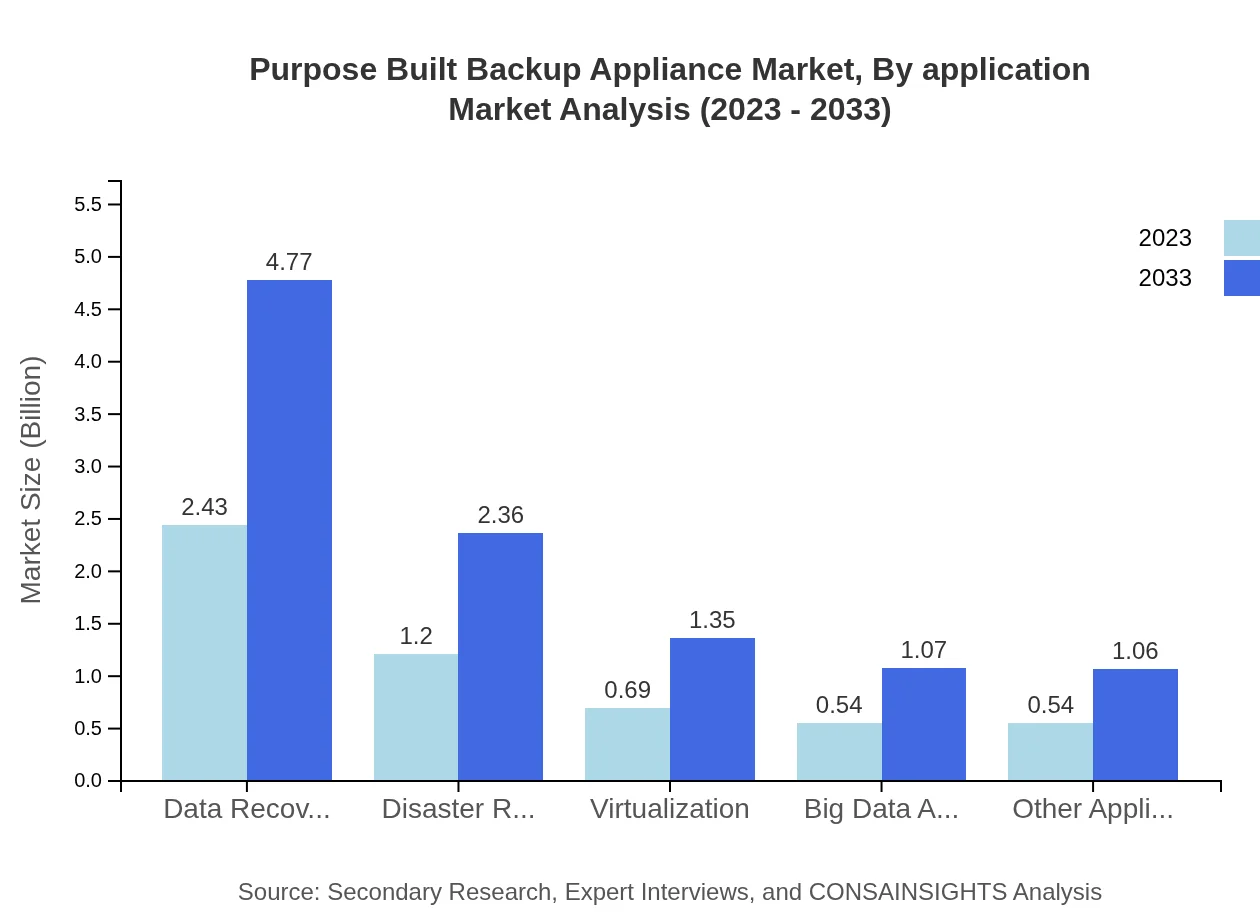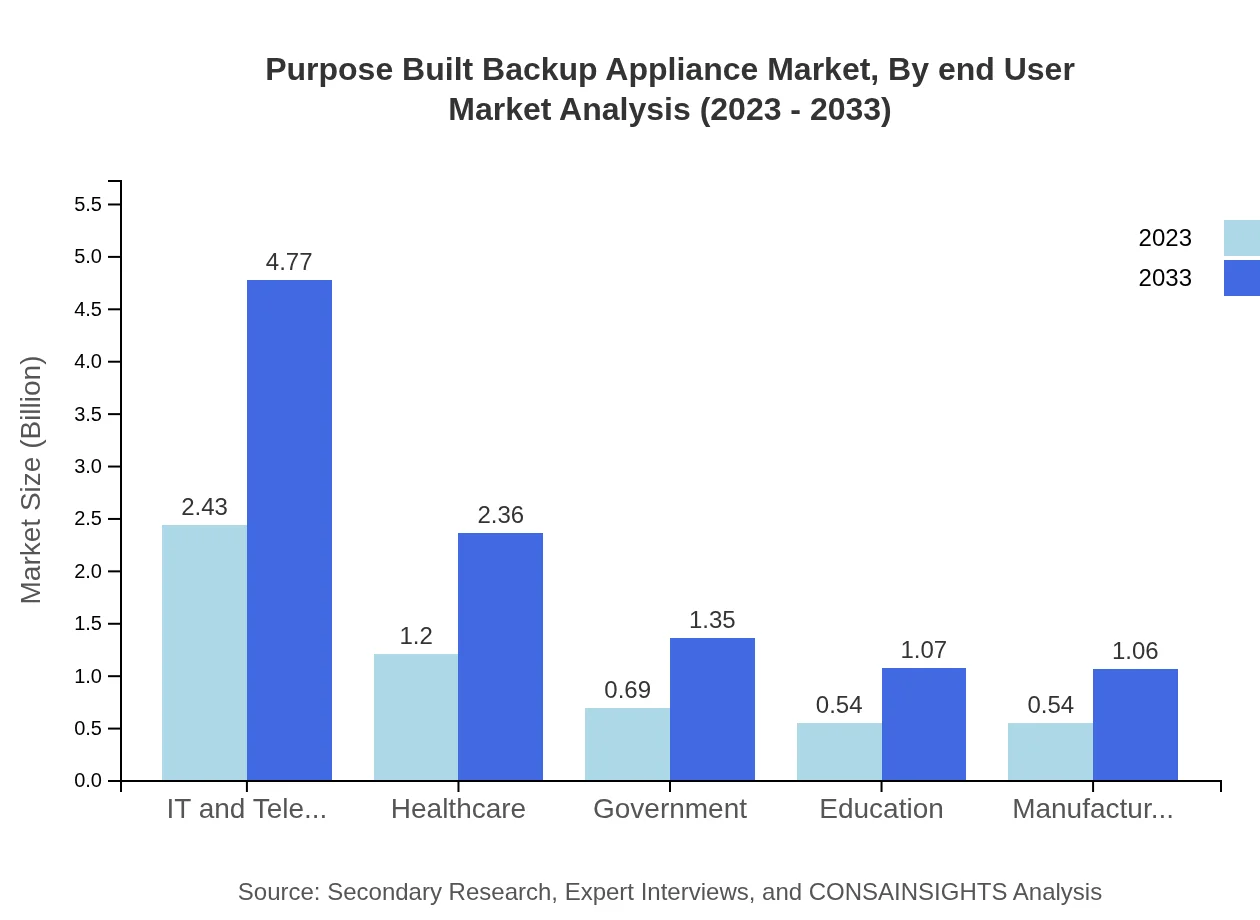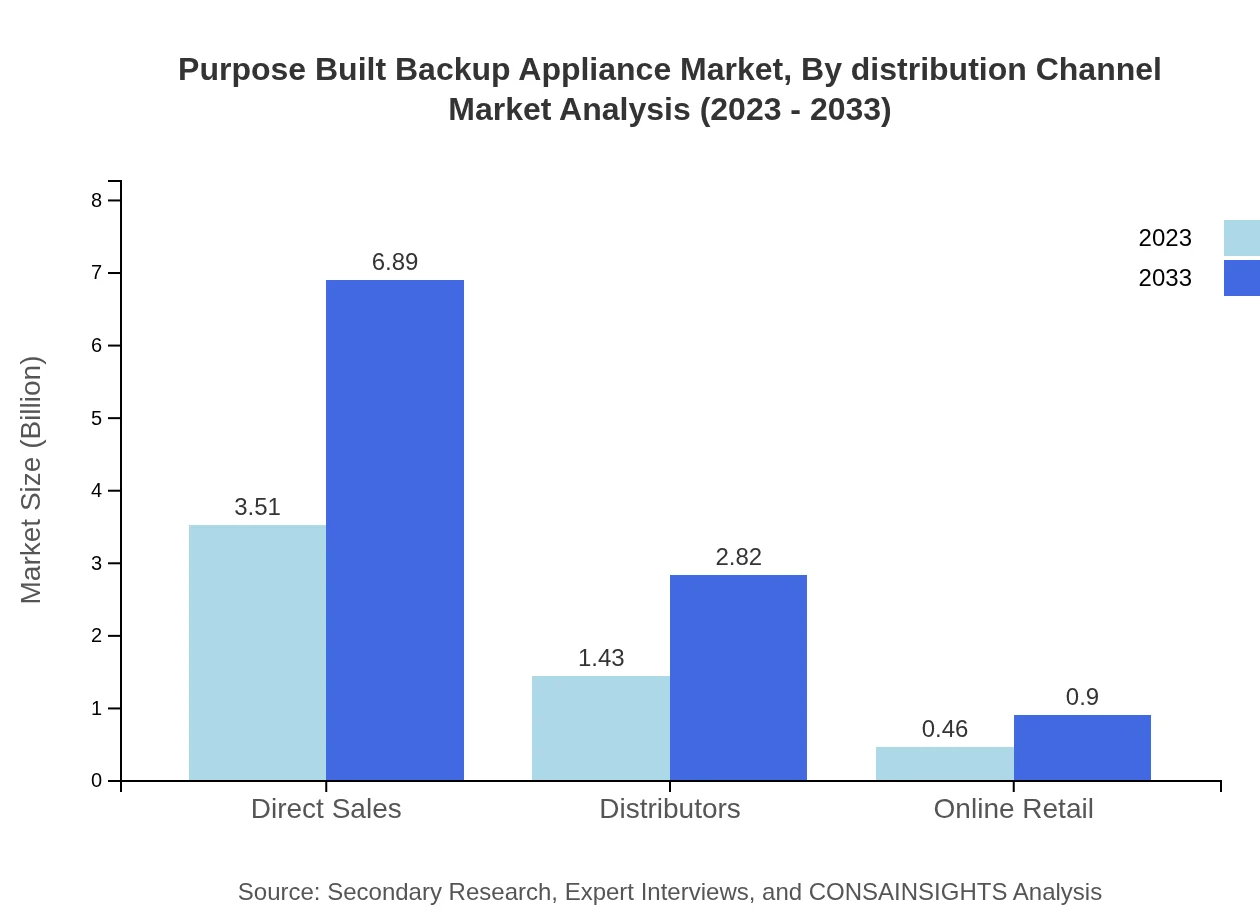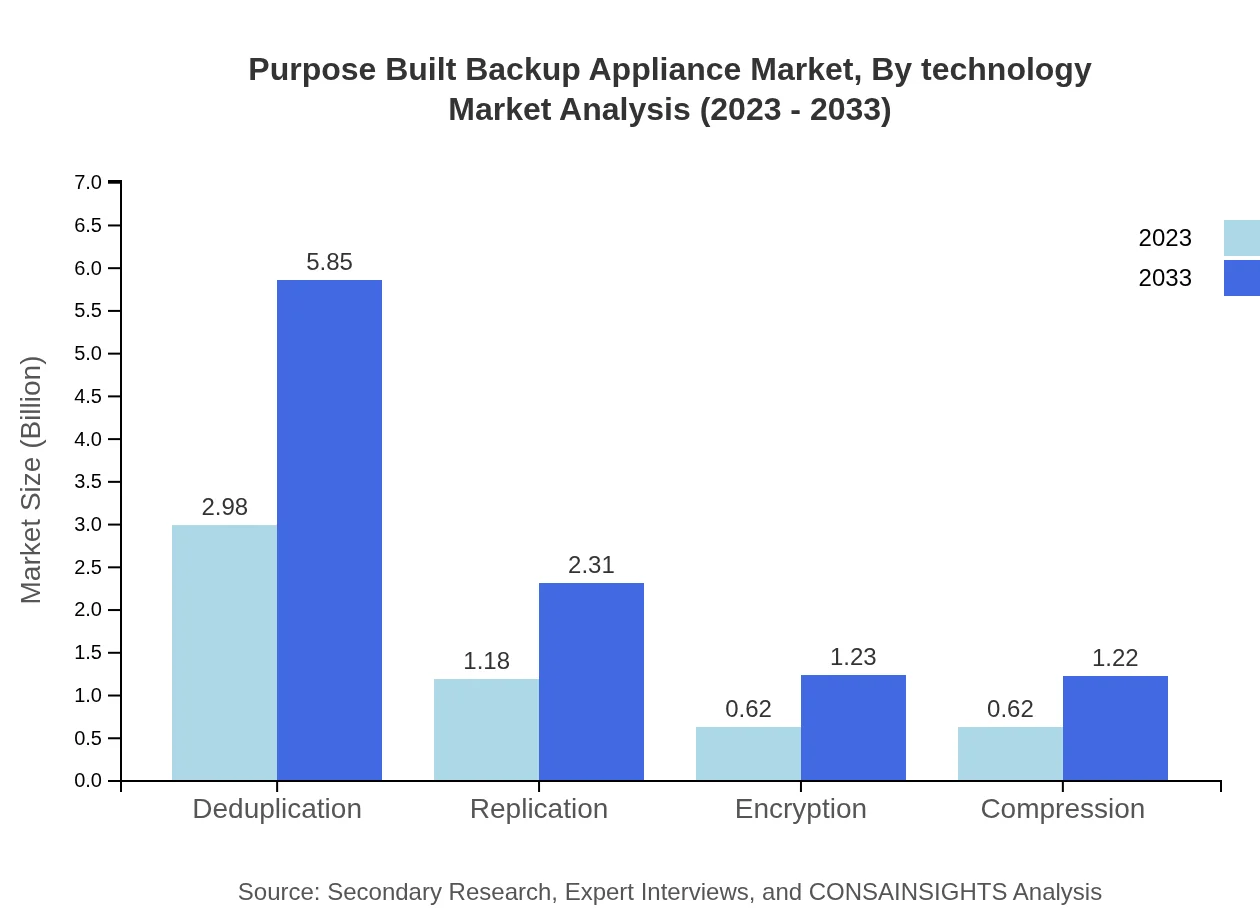Purpose Built Backup Appliance Market Report
Published Date: 31 January 2026 | Report Code: purpose-built-backup-appliance
Purpose Built Backup Appliance Market Size, Share, Industry Trends and Forecast to 2033
This report provides a comprehensive analysis of the Purpose Built Backup Appliance market from 2023 to 2033, highlighting market size, trends, and regional insights, while exploring the industry dynamics shaping the future of data protection and storage solutions.
| Metric | Value |
|---|---|
| Study Period | 2023 - 2033 |
| 2023 Market Size | $5.40 Billion |
| CAGR (2023-2033) | 6.8% |
| 2033 Market Size | $10.61 Billion |
| Top Companies | IBM, Dell Technologies, Hewlett Packard Enterprise (HPE), Veritas Technologies, Commvault |
| Last Modified Date | 31 January 2026 |
Purpose Built Backup Appliance Market Overview
Customize Purpose Built Backup Appliance Market Report market research report
- ✔ Get in-depth analysis of Purpose Built Backup Appliance market size, growth, and forecasts.
- ✔ Understand Purpose Built Backup Appliance's regional dynamics and industry-specific trends.
- ✔ Identify potential applications, end-user demand, and growth segments in Purpose Built Backup Appliance
What is the Market Size & CAGR of Purpose Built Backup Appliance market in 2023?
Purpose Built Backup Appliance Industry Analysis
Purpose Built Backup Appliance Market Segmentation and Scope
Tell us your focus area and get a customized research report.
Purpose Built Backup Appliance Market Analysis Report by Region
Europe Purpose Built Backup Appliance Market Report:
The European market is projected to advance from $1.36 billion in 2023 to $2.67 billion by 2033. Enhanced focus on data privacy regulations, like GDPR, significantly drives the demand for PBBAs, with organizations prioritizing secure backup solutions.Asia Pacific Purpose Built Backup Appliance Market Report:
The Asia Pacific region is anticipated to show significant growth, expanding from $1.17 billion in 2023 to $2.30 billion by 2033, driven by increasing digital transformation initiatives and data proliferation in emerging economies. Organizations in countries like China and India are significantly investing in advanced backup solutions due to rising cyber threats.North America Purpose Built Backup Appliance Market Report:
North America dominates the PBBA market, forecasted to grow from $2.02 billion in 2023 to $3.97 billion by 2033. The presence of leading players and cutting-edge technology adoption enhances market growth as enterprises prioritize robust data protection and compliance strategies.South America Purpose Built Backup Appliance Market Report:
In South America, the PBBA market, with an expected growth from $0.49 billion in 2023 to $0.97 billion by 2033, is driven by an increasing focus on data protection solutions amid rising data center establishments. The region is gradually adopting cloud services, contributing to the growing demand for backup appliances.Middle East & Africa Purpose Built Backup Appliance Market Report:
The Middle East and Africa region is growing steadily, with projections suggesting an increase from $0.36 billion in 2023 to $0.70 billion by 2033. The region's need for data sovereignty and compliance will drive investment in purpose-built solutions.Tell us your focus area and get a customized research report.
Purpose Built Backup Appliance Market Analysis By Product
In 2023, the disk-based backup appliances segment is valued at $3.51 billion, expected to grow to $6.89 billion by 2033, holding a 64.94% market share. Cloud-based backup appliances follow, starting at $1.43 billion and projected to grow to $2.82 billion, capturing 26.56% share, indicating a robust interest in cloud solutions.
Purpose Built Backup Appliance Market Analysis By Application
Data recovery and disaster recovery sectors are paramount in this market, with data recovery alone accounting for $2.43 billion in 2023, escalating to $4.77 billion by 2033, indicating a strong share of 44.93%. The healthcare application segment also highlights significant growth potential, propelled by compliance and patient data security.
Purpose Built Backup Appliance Market Analysis By End User
The IT and telecom sector leads with a market size of $2.43 billion in 2023, growing to $4.77 billion by 2033, maintaining a 44.93% market share. Healthcare follows closely, reflecting the sector's requirements for stringent data protection mechanisms, while government and education also demonstrate the growing investment in data management solutions.
Purpose Built Backup Appliance Market Analysis By Distribution Channel
The direct sales channel leads with a size of $3.51 billion in 2023, expanding to $6.89 billion by 2033, constituting 64.94% of the market share. Distributors maintain a significant presence, projected to increase from $1.43 billion to $2.82 billion, while online retail channels represent a growing segment as e-commerce continues to rise.
Purpose Built Backup Appliance Market Analysis By Technology
Technologies supporting deduplication dominate the market with a size of $2.98 billion in 2023, escalating to $5.85 billion by 2033. The integration of advanced technologies such as encryption and virtualization also plays a vital role in enhancing security and efficiency within the PBBA landscape.
Purpose Built Backup Appliance Market Trends and Future Forecast
Tell us your focus area and get a customized research report.
Global Market Leaders and Top Companies in Purpose Built Backup Appliance Industry
IBM:
IBM offers a comprehensive range of PBBA solutions that integrate seamlessly with hybrid cloud environments, leveraging advanced data protection technologies.Dell Technologies:
Known for its PowerProtect series, Dell Technologies provides versatile PBBA options tailored for diverse organizational needs and efficient backup operations.Hewlett Packard Enterprise (HPE):
HPE's solutions encompass PBBAs that deliver high performance and scalability for modern data protection with a focus on security and compliance.Veritas Technologies:
Veritas specializes in backup and recovery solutions, providing innovative appliances that enhance data integrity and availability across various sectors.Commvault:
Commvault's enterprise-level software and backup appliances are designed to simplify data management while ensuring robust protection and compliance.We're grateful to work with incredible clients.









FAQs
What is the market size of purpose Built Backup Appliance?
The global Purpose-Built Backup Appliance market is expected to reach a market size of approximately $5.4 billion by 2033, growing at a CAGR of 6.8% throughout the forecast period from 2023 to 2033.
What are the key market players or companies in this purpose Built Backup Appliance industry?
Key players in the Purpose-Built Backup Appliance market include leading technology firms specializing in data management and protection solutions. These companies are primarily responsible for product innovation and market expansion.
What are the primary factors driving the growth in the purpose Built Backup Appliance industry?
Significant factors driving growth in the Purpose-Built Backup Appliance market include the increasing need for data protection, growing cyber threats, and the expansion of cloud-based solutions, leading to a heightened demand for secure backup solutions.
Which region is the fastest Growing in the purpose Built Backup Appliance?
The fastest-growing region for Purpose-Built Backup Appliances is expected to be North America, with market expansion from $2.02 billion in 2023 to $3.97 billion by 2033, reflecting the region's strong emphasis on data security.
Does ConsaInsights provide customized market report data for the purpose Built Backup Appliance industry?
Yes, ConsaInsights offers customized market report data tailored to specific client needs in the Purpose-Built Backup Appliance industry, ensuring comprehensive insights and analysis that aligns with business objectives.
What deliverables can I expect from this purpose Built Backup Appliance market research project?
Deliverables for the Purpose-Built Backup Appliance market research project include comprehensive reports, market forecasts, segment analysis, and insights into competitive dynamics within the industry, helping in decision-making.
What are the market trends of purpose Built Backup Appliance?
Current market trends in the Purpose-Built Backup Appliance sector include the rise of cloud-based solutions and hybrid systems, with significant shares reported in sectors like IT and telecom, which enhance data security and recovery capabilities.

